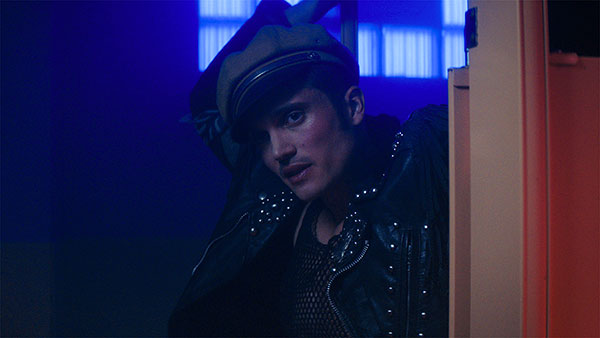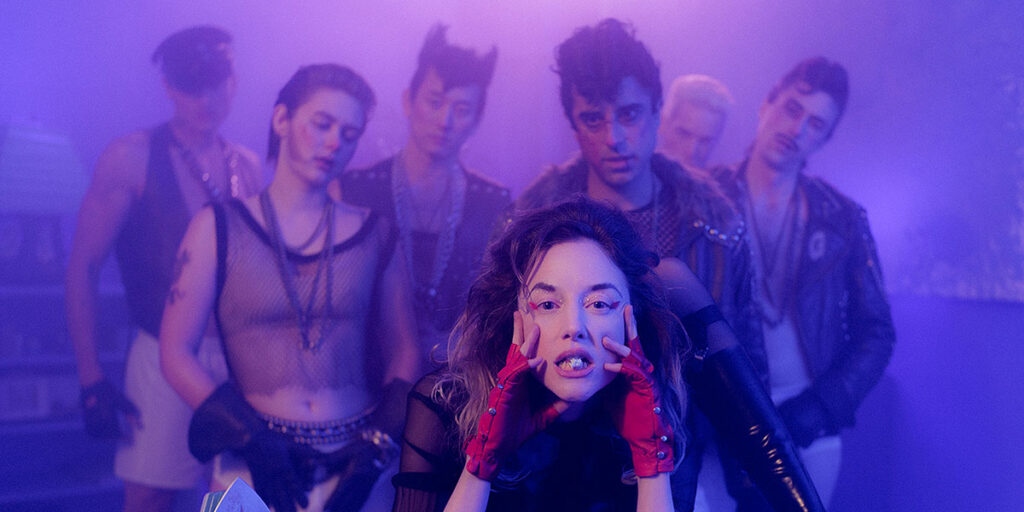Please Baby Please is an imaginative and visually entrancing feature by Amanda Kramer, who showcases her directorial playfulness and genre-bending antics in full effect.
Although she hasn’t done that many shorts or features, Amanda Kramer has found her niche – her key to making a distinctive filmography in the times of mainstream cinema’s “copy and paste” procedures – making her a voice worth hearing in the independent cinema market. It is rare to get that touch so quickly in one’s career, but Kramer has done it. Even if all her works haven’t been acclaimed, particularly Ladyworld (which vastly divided audiences back in 2018, including me), there’s still potential and noticeable sheer talent in what Kramer makes. This distinction is not present in her directorial and stylistic decisions but in her approach to the respective narratives and topics she tackles. Her films talk about liberation, personal freedom, and desires in a quite radical yet colorful and vivid way. Now, she dwells into camp and combines it with her usual stylistic antics, yet with more flair, to deliver Please Baby Please – her first of two features being released this year.
Please Baby Please is a strange concoction rarely made in today’s cinematic landscape. Kramer’s latest feature combines 1950s musical magnetism, Grease-esque dialogue, and the leatherbound and gritty nature of the underbellies of New York City with a big slice of flamboyant camp and cheesiness, which helps it garner some future cult classic novelty aesthetics. From the lighting to the costume design, you see that these stylistic choices try to emulate the past while putting in a modern subtext, contrasting the look and narrative with the universal themes Kramer dwells on in her features.
Set in the 1960s, Please Baby Please begins with a camera floating on an alleyway covered in blue and pink hues and a bright spotlight, where a couple of gang members from the Young Gents are preparing for a brawl. Immediately, you can start noticing the musical references; the guys look like they were members of the T-Birds greaser gang in Grease, and its first few minutes are a tad similar to those of West Side Story.
The greaser gang’s first confrontation ends with the victims getting murdered; however, in their second one, quite the opposite happens. Susan (Andrea Riseborough) and Arthur (Harry Melling) encounter them while getting to their new home, but they escape with their lives thanks to Teddy (Karl Glusman), the gang’s leader, who lets them go. The Young Gents just wanted to taunt them rather than beat them to a pulp, which starts a journey of self-discovery, liberation, and exploration in their gender roles for the pair of young lovers, who meet an array of characters that help them traverse their respective individualities and devotions.
Because of this traumatic event, the two lovebirds can’t sleep; they try to occupy themselves due to insomnia and panic about the gang’s misbehavior. While Susan meets one of the apartment’s tenants, an eccentric public figure named Maureen (Demi Moore) who awakens the search to find her true self, Arthur questions how a man is “supposed” to act. Not only does the conflict with The Young Gents cause this inner flame to burn faster and brighter, but a scene at the film’s beginning does as well.

In that scene, while Susan washes the dishes, Arthur tries to fix a chair – both are bored with the notion of doing such acts. Susan throws away the pink glove, and Arthur does the same with the screwdriver, serving as an act of rebellion against a society that has a definition of what a man or woman is supposed to act like. These are two of the first scenes in which Amanda Kramer puts her characters on a journey of self-discovery. With each step they take, Susan and Arthur get closer to reaching the state of being able to express themselves clearly to one another and not be forced to act like society “demands”. It’s just like Arthur says during a night at a bar: “I am a man. I just don’t feel the need to act male.” These scenes are the key to Please Baby Please – the glue that holds its slowly breaking heart together in the most beautiful fashion. It begins with Arthur and Susan bickering with one another to gradually realize the struggles they have faced while trying to succumb to the “established” gender roles and accepting one another.
This is captured by some tongue-in-cheek and heightened dialogue by Kramer and co-writer Noel David Taylor. It’s both quickly witted and smartly scripted, which creates a captivating tonal balance of campiness and romance that studies sexual power through a leatherbound and colorful setting. The occasionally over-the-top script matches the over-stylized aesthetics of the film’s production (from the hairstyles to the bisexual lighting), both of which add layers to the queer themes Kramer tackles. The avant-garde and experimental imagery feel inspired by the works of Kenneth Anger and John Waters, although without the former’s viscerality or the latter’s dirtiness. In addition, Kramer adds elements of magical realism, where conversational scenes transition into dreamy musical sequences where the erotic desires of the characters are expressed through cavorts filled with tenderness and devotion. Dance is one of the best forms of artistic expression, and Please Baby Please’s dance sequences offer depth to the characters’ journey, each serving as a chapter of their growth.
Amanda Kramer should deserve praise for her work. Still, equal recognition should be given to the film’s leads, Harry Melling and Andrea Riseborough, one of the most intriguing actors working today. Both are committed to the job and understand what the director is going for, delivering performances that are on-the-nose yet powerful. The two give their lines with forte and acute comedic precision, sharply balancing the film’s tonal shifts. They counterbalance each other’s performance; while Melling is reserved and filled with inner sorrow, Riseborough remains head-high with rage. Her performance is transformative, as Susan’s journey of achieving inner peace and embracing her masculinity causes an outward expression of angst. It’s great to see Kramer evolving as both a writer and director; you clearly know that she’s more comfortable with the genre-bending playfulness of Please Baby Please rather than the stripped-down approach she took in Ladyworld.
Bolder and imaginative with her directorial choices, Kramer is intrigued by the combination of the political, sexual, and personal to create unique stories that stick with us due to the film’s flair and messages of self-love. Its ending presents a melodic split-screen sequence, in the way of Gaspar Noé and a toned-down Bertrand Mandico, that separates the two characters of Susan and Arthur – marking their transformations as individuals and the acceptance of their true selves. With Please Baby Please, Amanda Kramer keeps the audience entranced by the film’s looks and aesthetics and its messages of self-love, embracement, freedom, and vulnerability. It may be too campy and quirky for some audiences, yet it is definitely a film worth watching due to its visionary nature of exploring universal themes. I can’t wait to find out what Kramer has in store next, especially her second feature this year, Give Me Pity!.
Please Baby Please is now available to watch on digital and on demand in the US, and will be released on MUBI in the UK & Ireland from March 31, 2023.

